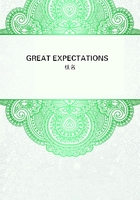
第99章
ON our arrival in Denmark, we found the king and queen of that country elevated in two arm-chairs on a kitchen-table, holding a Court. The whole of the Danish nobility were in attendance; consisting of a noble boy in the wash-leather boots of a gigantic ancestor, a venerable Peer with a dirty face who seemed to have risen from the people late in life, and the Danish chivalry with a comb in its hair and a pair of white silk legs, and presenting on the whole a feminine appearance. My gifted townsman stood gloomily apart, with folded arms, and I could have wished that his curls and forehead had been more probable.
Several curious little circumstances transpired as the action proceeded.
The late king of the country not only appeared to have been troubled with a cough at the time of his decease, but to have taken it with him to the tomb, and to have brought it back. The royal phantom also carried a ghostly manuscript round its truncheon, to which it had the appearance of occasionally referring, and that, too, with an air of anxiety and a tendency to lose the place of reference which were suggestive of a state of mortality. It was this, I conceive, which led to the Shade's being advised by the gallery to `turn over!' - a recommendation which it took extremely ill. It was likewise to be noted of this majestic spirit that whereas it always appeared with an air of having been out a long time and walked an immense distance, it perceptibly came from a closely contiguous wall. This occasioned its terrors to be received derisively. The Queen of Denmark, a very buxom lady, though no doubt historically brazen, was considered by the public to have too much brass about her; her chin being attached to her diadem by a broad band of that metal (as if she had a gorgeous toothache), her waist being encircled by another, and each of her arms by another, so that she was openly mentioned as `the kettledrum.' The noble boy in the ancestral boots, was inconsistent; representing himself, as it were in one breath, as an able seaman, a strolling actor, a grave-digger, a clergyman, and a person of the utmost importance at a Court fencing-match, on the authority of whose practised eye and nice discrimination the finest strokes were judged.
This gradually led to a want of toleration for him, and even - on his being detected in holy orders, and declining to perform the funeral service -to the general indignation taking the form of nuts. Lastly, Ophelia was a prey to such slow musical madness, that when, in course of time, she had taken off her white muslin scarf, folded it up, and buried it, a sulky man who had been long cooling his impatient nose against an iron bar in the front row of the gallery, growled, `Now the baby's put to bed let's have supper!' Which, to say the least of it, was out of keeping.
Upon my unfortunate townsman all these incidents accumulated with playful effect. Whenever that undecided Prince had to ask a question or state a doubt, the public helped him out with it. As for example; on the question whether 'twas nobler in the mind to suffer, some roared yes, and some no, and some inclining to both opinions said `toss up for it;' and quite a Debating Society arose. When he asked what should such fellows as he do crawling between earth and heaven, he was encouraged with loud cries of `Hear, hear!' When he appeared with his stocking disordered (its disorder expressed, according to usage, by one very neat fold in the top, which I suppose to be always got up with a flat iron), a conversation took place in the gallery respecting the paleness of his leg, and whether it was occasioned by the turn the ghost had given him. On his taking the recorders - very like a little black flute that had just been played in the orchestra and handed out at the door - he was called upon unanimously for Rule Britannia.
When he recommended the player not to saw the air thus, the sulky man said, `And don't you do it, neither; you're a deal worse than him !'
And I grieve to add that peals of laughter greeted Mr Wopsle on every one of these occasions.
But his greatest trials were in the churchyard: which had the appearance of a primeval forest, with a kind of small ecclesiastical wash-house on one side, and a turnpike gate on the other. Mr Wopsle in a comprehensive black cloak, being descried entering at the turnpike, the gravedigger was admonished in a friendly way, `Look out! Here's the undertaker a coming, to see how you're a getting on with your work!' I believe it is well known in a constitutional country that Mr Wopsle could not possibly have returned the skull, after moralizing over it, without dusting his fingers on a white napkin taken from his breast; but even that innocent and indispensable action did not pass without the comment `Wai-ter!' The arrival of the body for interment (in an empty black box with the lid tumbling open), was the signal for a general joy which was much enhanced by the discovery, among the bearers, of an individual obnoxious to identification. The joy attended Mr Wopsle through his struggle with Laertes on the brink of the orchestra and the grave, and slackened no more until he had tumbled the king off the kitchen-table, and had died by inches from the ankles upward.